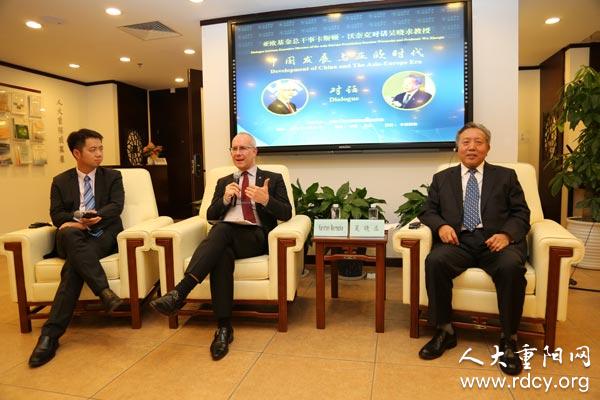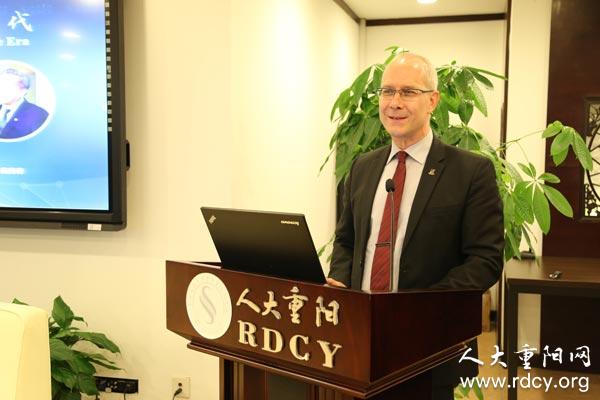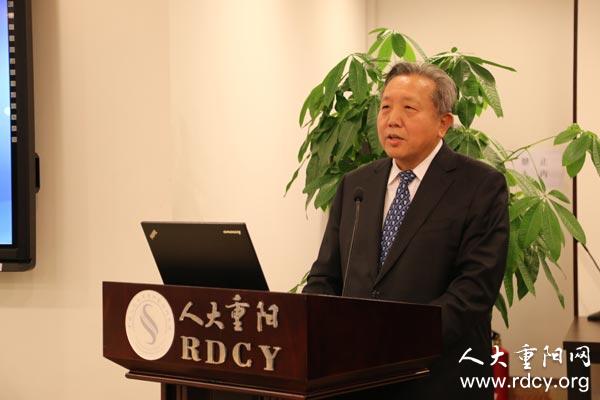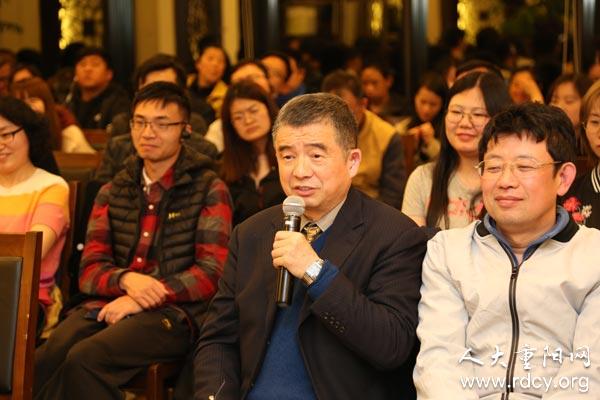Picture
Your Present Location: HOME> PictureASEF Executive Director: Asia and Europe join hand for a better future

On the evening of April 27, the 41st Chongyang Forum was held in Chongyang Institute for Financial Studies at Renmin University of China (RDCY). Karsten Warnecke, 7th Executive Director of the Asia-Europe Foundation (ASEF), delivered a speech on the theme “Development of China and The European New Era”, and had a dialogue with Wu Xiaoqiu, vice president of Renmin University of China. Wang Wen, executive dean of RDCY, presided over the event. Zhou Rong, a senior fellow of RDCY, commented in the event as a guest.

In his speech, Kaston Warnick said that compared with the relations between Europe and the United States, as well as the close ties between the United States and some Asian countries, there is a lack of sufficient exchanges between countries of Asia and Europe in addition to traditional trade and investment. With this in mind, in 1996, Singapore Government joins hands with the France, then rotating presidency of the European Union, to host a summit between Asia-Europe leaders, which was the origin of the Asia-Europe Summit, and held meetings biennially during the past 23 years.
Following the first Summit in 1996, the Asia-Europe Foundation was established in 1997, focusing on issues such as culture, academic exchanges, education, sustainable development, environmental protection, governance and human rights, as well as public health, economy and the media.
In addition to economic and trade ties, cultural exchanges between Asian and European countries have also become increasingly prosperous. More and more Chinese students studied in Europe, and more European students are going to live and study in China or other Asian countries. Exchanges between experts and scholars are also very frequent. The two continents are increasingly linked to each other and partnerships between countries continue to develop.
Over the past few years, major shift has taken place in the geopolitical landscape of Asia and Europe. The most obvious is the rise of China. A example is the "Belt and Road" , a development initiative that includes infrastructure and investment, focuses on connectivity and cooperation, and aims to build a better future.
Other countries may be sceptical about the BRI, believing that the BRI is that China wants to play a greater role in the international arena. However, no matter how we look at the initiative, we cannot ignore that it is an initiative for the largest infrastructure investment and construction, on which we have reached a consensus.
He noted that the United States is gradually withdrawing from the multilateral mechanism, and the hollowing out of power is gradually emerging, a trend that forces Asia and Europe not only to reassess their relations with the United States, but also to reassess their relations with the United States. At the same time, you need to rethink your region and your role in the world.
To Europeans, Asian countries now look like very stable partners, at least more stable and reliable than the US. American prioritarianism has triggered the rise of protectionist forces. Then there is an idea among Asian and European countries, replacing the United States with new Asian-European ties. China has replaced the United States as Germany's main trading partner outside the European Union, which is also China's largest trading partner. The European Union is also ASEAN's largest investment partner, surpassing Japan as the second largest investor after China, and ASEAN is also the EU's third largest trading partner, after the United States and China. In the past few years, the European Union has also signed a series of free trade agreements with South Korea, Singapore, Japan, and then EU is preparing to start trade negotiations with India, Vietnam, Malaysia, Thailand, Philippines, Australia and New Zealand.
Kaston Warnick stressed that China and the EU also need to adapt to each other, such as coordination in intellectual property rights and market access, 16+1 cooperation and cultural exchanges. Asian and European countries will work together to discuss bilateral and global issues and find sustainable solutions for a better future.

In the dialogue, professor Wu Xiaoqiu noted that Mr. Kaston Warnick’s speech was rich in content and diverse in perspectives. Professor Wu stated that China has attached importance to the inclusive development since ancient times, because only inclusion can make the world prosper, and facilitate countries to absorb all civilizations in the world. As a global power, China make its own contribution to the world, and Chinese wisdom and experience are important contributions to human civilization. Professor Wu also expressed his views on intellectual property rights, market economy and 16 + 1 cooperation.

In the comments, Zhou Rong noted that the speeches made by Professor Wu and Professor Warnick are a dialogue between European and Asian civilizations, and that Europe and Asia need to learn from each other and work together to create a better era.
>>>Karsten Warnecke dialogues with Wu Xiaoqiu: Development of China and The European New Era























































































 京公网安备 11010802037854号
京公网安备 11010802037854号





